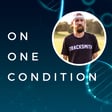Become a Creator today!Start creating today - Share your story with the world!
Start for free
00:00:00
00:00:01

Episode 32: Gary Ho - Gout
Gary suffered from Gout for 16 years before getting a diagnosis. The disease affected him so badly that he had to walk with crutches. He shares how he advocated for himself to finally get a diagnosis and the positive impact it had on his life. We also discuss how to prevent Gout flares, through diet and medication.
This episode is very personal for me, as I also suffer from Gout. I share my own experience, which is very different to Gary's.
The song that Gary chose is Hi Ren by Ren.
Transcript
Introduction and Personal Stories
00:00:00
Speaker
Hi, I'm Sylvain Bertolo, and you're listening to On One Condition, a podcast to raise awareness about health conditions by listening to people who leave them every day. Today, my guest is Gary Ho, and we're going to talk about a condition that's close to my heart because I also have that condition, which is gout. Hi, Gary. Nice to meet you. Thank you for joining me on the podcast. How are you?
00:00:27
Speaker
I am so good. Thank you for having me this morning. I am happy to be here. Me too. I'm very much looking forward to the discussion as well. So as you know, I love starting by a song. So would you like to tell us which song you chose and why? Yeah, absolutely. So dealing with, well, living with a rare condition, gout,
00:00:53
Speaker
I know that for many people in this position, they deal with mental health. And so I came across a song by an artist named Ren, about a month ago, just on YouTube. And the name of the song is Hyde Ren. And it's basically him having a conversation with himself. And it's a
00:01:17
Speaker
very raw and powerful performance. It's him talking to himself about doubting and feeling alone and his dark side talking to him about how he's not good enough and him talking back and saying, hey, I am good enough and I am okay being who I am.
00:01:40
Speaker
And it's just such a raw performance, like I said. So I would encourage anybody that is dealing and thinking about mental health issues to go ahead and look up this song. Again, it's called Hydren. I'm not ashamed to plug this artist. I think he's awesome.
00:02:01
Speaker
That's my song. I don't think I know the song, so I'm definitely going to look it up. But yeah, I agree with you. It's a very good artist and very different to what you tend to hear. So yeah, it's very good. Thank you for the recommendation.
00:02:21
Speaker
Yes. Today we're talking about gout. I know that you've had quite a long time before having your diagnosis. I think it would be interesting to start here if you don't mind. Would you be able to share with us what the diagnosis process was for you? Yes, absolutely.
00:02:45
Speaker
So let's start with the first experience of gown. That would be in 1994. I was 24 years old at the time. And remembering walking across campus, going to a class. And as I was walking, I felt my ankle twitch a tad bit. And that evening,
00:03:13
Speaker
the pain continued to come on. And it felt like a swollen, almost like a fractured ankle by the end of the night. So it started at mild. Then it got severe spring. And by the end of that night, it felt like it was just broken. And the pain was throbbing. It felt like there were
00:03:39
Speaker
low, tiny men inside my ankle with pitchforks, grabbing themselves, trying to get out, right? A thousand needles trying to come out from my ankle. And I had never experienced pain like that night. And I called up my dad and I said, dad, I don't know what is going on, but this is what I am experiencing.
00:04:04
Speaker
And I remember him saying, Gary, I think you might have gout. And I was thinking, I don't know what gout is. Gary, go to a doctor as soon as you can and tell them that gout runs in your family. So I did it. I called up my doctor, my family practitioner, made an appointment, came into his office, maybe a couple of weeks later.
00:04:31
Speaker
And I sat in his office and I said, hey, doctor, this is what happened. I was walking across campus. My ankle started to hurt. It's the most intense pain I've ever felt in my life to this point. And I think I might have gout because my dad says he has gout and he thinks it runs in the family. And that doctor looked at me in 1994 and he says, you are way too young to have gout.
00:05:01
Speaker
And so a part of me was so relieved and I was like, oh, thank God, my dad's wrong. I don't have to doubt whatever that is. And so the doctor just said, go home, take some pain medication, maybe some aspirin and you'll be fine. You probably did something that you didn't remember. Maybe you ran, you tripped and you're not telling me.
00:05:22
Speaker
You know, and I'm thinking, well, I definitely didn't do that, but I wasn't gonna argue with the doctor. And I, you know, I felt like, okay, well, I won the lottery, I don't have gout, so I'm on my way. And I gotta tell you, with time though, the pain did go away, and out of sight, out of mind, I just didn't really think much of it. But as time goes on, what I've learned is that gout is a progressive disease.
00:05:51
Speaker
And so even if you don't feel the pain that comes on through an attack, it does not mean that gout has gone away. In fact, there are no cures for gout at this time. We don't have a cure for gout. The best thing that we can do is manage gout. And so for the next 16 years, the pain came back and forth. And with each
00:06:15
Speaker
flare that came, it became worse and worse. So the pain would intensify and the duration of the attack would last longer. And each time the attack would come on, I would go to a doctor. They would tell me I'm too young for gout and I would go home. And I would try to treat the pain with the medication that I can find over the counter.
00:06:42
Speaker
Ultimately, though, it got so bad that I was using crutches, using a wheelchair. And remember, my first attack was in 1994. And it wasn't until the year 2000, when I was at my wit's end, I was living in constant pain.
00:07:09
Speaker
I had developed what's called, you know, they're called TOFI. Basically, uric acid crystals form around your joints. So for people that live with gout, we're lucky you and I have gout where we're blessed in the fact that we were overachievers, my friend, our body over produces uric acid and we under excrete that that
00:07:34
Speaker
chemical and so our body over produces the uric acid and when the uric acid gets goes high enough it gets to a certain point where it becomes saturated and when it becomes saturated there's nowhere else for that crystal to go and so it starts to form and it starts to develop lumps around your joints soft tissue and usually the big toe
00:08:02
Speaker
The ankle, the wrist, the elbow, you know, you'll feel pain in those areas. Sometimes, if it's bad enough, it can be found in your spine, sometimes in your heart, even. And so if left untreated, it can be really bad for one's health, if you can imagine.
Diagnosis Journeys: Gary vs. Sylvain
00:08:24
Speaker
In 2010, I was at the point where I described my rock bottom. I was living in pain. I felt so isolated. I felt so alone, misunderstood. My mental health was not doing well at all. I wanted to give up. And I remember thinking, if I don't take control of my life, I'm going to lose it.
00:08:52
Speaker
And so I decided that I was going to do everything I could to try and find a solution, an answer, because this is no way to live. And I found out that the person or people, the health specialists that look and treat gout, they're called rheumatologists. And at the time, my health benefits in America
00:09:18
Speaker
allowed me to finally find my own doctor. I did not have to ask for a doctor for a referral to a specialist. So that was an issue. It's kind of an issue in America. But at that time, I was able to pick my own physician, and I went ahead and found a rheumatologist.
00:09:40
Speaker
I met with him and I remember sitting in his office and within 10 minutes I was able to just, I threw up 16 years worth of experience onto him. I said, Doc, this is what's going on. And he says, he looks at me with compassion and empathy.
00:10:03
Speaker
He says, Gary, it sounds like you have gout. I'm like, oh my God, the guy heard me. He heard what I was saying. I remember him saying, Gary, it's very easy to diagnose. We will do a blood test and if your acid level is above 6.8 milliliters,
00:10:27
Speaker
You probably have gout. And I was thinking to myself, are you kidding me? You're telling me that all we needed to do was a blood test to figure out if I had gout or not?
00:10:41
Speaker
And for 16 years, I was begging somebody just to figure out what the solution, what the issue was for me so I can figure out a solution. And it was a blood test, my friend. They wouldn't even do a blood test, which, you know, do you know how much a blood test costs, by the way?
00:10:57
Speaker
I don't, but it's not much, is it? Twenty dollars. It's incredible. I couldn't believe it. But when I was finally diagnosed, I had chronic gout. And chronic gout is basically uncontrolled gout flares or gout attacks coming down more than two times a year. So if you're experiencing a gout attack,
00:11:26
Speaker
Two or more times a year, that's chronic gout. And when they did my blood test,
00:11:36
Speaker
My uric acid level was close to 10. It was very close to that level, very high. And my guess is that I had been living with that high uric acid level for years, years. I had lost all my late 20s and all my 30s to this disease. And so, you know, in a nutshell, that was my experience with GAL
00:12:05
Speaker
to getting a diagnosis. So 16 years, I call it 16 years in the wilderness, just kind of roaming around. It sounds terrible. And it's crazy because I have my own experience with gout is completely different. I was diagnosed very quickly compared to you.
00:12:33
Speaker
I had what you described, like the big toe, the joint, that was extremely painful. I like your description, actually. Tiny men with pitchforks is pretty bang on. And yeah, a nurse practitioner saw my big toe, a bit of swelling, redness, and said, I think you might have gout.
00:13:02
Speaker
and I had the blood test and within two weeks it was confirmed.
00:13:07
Speaker
but share a different experience as well. More recently, I wasn't really on top of my diet and my big two was feeling okay and I didn't really pay much attention. But I had kind of, it wasn't really pain, it was discomfort in my right foot. Like under, almost as if it was under the top of my right foot.
00:13:38
Speaker
And I thought it was down to running because I do a lot of running, but I couldn't get on top of it. And then one day I thought, well, maybe it's gout. And I changed my diet and it was, but because the pain was different, the location was different, it didn't come to mind quickly enough. And I had that for maybe two or three months.
00:14:01
Speaker
Well, you said something you don't argue with your doctor, which is true, but at the same time, it's difficult when you know you've got something and...
00:14:16
Speaker
you know that you're not necessarily getting what you need. So what
Advocacy and Management of Gout
00:14:21
Speaker
was that moment? You talked about it a bit like that you found that you wanted to give up if you didn't do something. So what actually made you do something?
00:14:33
Speaker
Yeah, that's a great question. Thank you for bringing that up. I think for many of us, we look at our healthcare partners, you know, the healthcare specialists out there, our doctors, we have high confidence in them. And we look at them with trust and admiration, you know, and when I go see my doctors, I have
00:14:58
Speaker
high faith that they know what they're doing. And they know what, you know, when they tell me something, I believe them, I believe them. What I'm finding out is that, and I want to talk down about the healthcare industry at all, I will say that as a patient,
00:15:20
Speaker
We need to learn that we have our own voice and we have to learn to be advocates for ourselves. And that's not taken away from doctors or what they do. But I gotta tell you, it's okay to ask for a second opinion. It's okay to go in there and when you tell your doctor what you're experiencing and you're feeling that you're not being heard,
00:15:49
Speaker
it's okay to step back and say, hey, what I'm feeling is actually true. It's right. And maybe the doctor knows what he's talking about because he's, you know, in that moment, he's going off of some, I don't know, medical teachings that are outdated. I don't know. But I know what I'm experiencing. And I know what my family history has. That is true.
00:16:16
Speaker
And I can tell you, here are the symptoms. The problem is, I got to tell you, when you go to a doctor and you're trying to explain your symptoms, I almost explain it like it's like going to an auto mechanic with your car, right? And your car is making a noise. And like you come in there with your car and you're like, okay,
00:16:38
Speaker
It's making this noise and the mechanic's looking at the car and he's like, well, it's not making the noise now. I'm telling you, it's making that noise. He's like, well, bring it back when it's making the noise. Well, I'm sorry. Think of it in a disease way. You're coming in, you're talking about gout. I'm telling you, my toe last month was swollen red.
00:17:05
Speaker
And you have to think your average person takes two or three months before they can come see a doctor. And with a specialist, sometimes it's four to six months before they can see a specialist. And it's so hard.
00:17:19
Speaker
If the doctor's looking for a physical sign of it, it's hard to maintain that physical symptom for like four months. And so what I'm saying is that if you think that you're living with a certain disease and you need help or you need the diagnosis, if one doctor is not giving you the answer that you think is needed for yourself because you know what you're going through, you need to be your own advocate. It took me 16 years to learn that truth.
00:17:49
Speaker
Yeah, that's a very, very good point to make. And I'm glad you're making it because I think that's probably one of the most difficult aspects of getting a diagnosis. And you're right that we trust doctors
00:18:09
Speaker
But they may not have encountered this disease or you may be too young for the textbook explanation of the disease. But it's important to keep pushing. That's right.
00:18:30
Speaker
Since your diagnosis then, do you manage GART better and how do you manage it? Yes, and so what I've learned
00:18:43
Speaker
is that with gout, there's two ways that physicians and people typically manage gout. I call it proactively and reactively managing gout. Many people manage gout reactively, meaning they wait for the pain to come on.
00:19:02
Speaker
When the pain comes on, that's when they think, oh, it's gout. I have to deal with this pain because it's intense. And so they're using pain medication. Many doctors, I would say 80% of the doctors in America will use a steroid, maybe ingestion, maybe a 10-pack steroid. They might use
00:19:23
Speaker
anti-inflammatory medication just to deal with the pain. So we're just masking the symptoms. Only 20% of the doctors understand that gout. In fact, if you are to manage gout,
00:19:37
Speaker
effectively, you have to be proactive with this disease. You have to understand what the cause is. And the cause is high uric acid level within the body. And so there are two main medication that is being used. And again, for the listeners, I am not a doctor. I don't claim to be a doctor. I am a person that I have lived with gout since I was 24 years old, and you can do the math. I'm well in my 50s now.
00:20:07
Speaker
And since being diagnosed and understanding how to treat gout proactively, I have not experienced an attack since 2010, since my diagnosis. So I've been free and clear. I eat anything I want in moderation. There are no restrictions on my diet whatsoever. And so I have to back up and say that proactively managing gout is akin to
00:20:36
Speaker
dealing with a house and making the house fireproof. You don't wait for the house to get on fire. You understand that you might be living in the woods. You're surrounded by trees.
00:20:47
Speaker
in their dry seasons, you're proactively managing that problem. So you might trim the trees around your area. You might treat your house and make it fireproof, right? You might do things that will proactively prevent the fires from happening. So too with gout, you understand that your body naturally overproduces your acid.
00:21:10
Speaker
And so you have to take certain medications to lower that uric acid level, to keep it well below six. And with our, we started a support group called the Gout Support Group of America. And that was started in 2015. Out of the need, I felt
00:21:33
Speaker
the need for having a safe place where people living with this disease can come and look for information and find support. And so within that GALP Support Group of America, we talk about proactively managing GALP. And there are two medications that we constantly tell people. We tell people that you need to look for, maybe allopurinol is one medication. The other one is fabulistat, which is
00:22:03
Speaker
Uloric, Uloric is the main name of the medication. These two medications are designed specifically to lower your uric acid level.
00:22:17
Speaker
I take my medication every day religiously. I preach about acting on the data. And so if you know where your acid level is at, and if it's well below six
00:22:35
Speaker
then you know that you're going to be fine as you eat. Maybe you have a glass of wine and you're eating a steak, but you know your levels, you're averaging maybe a 3.5 or 4 milliliter in uric acid. You know you're not going to go over that.
00:22:53
Speaker
And the big question we always get is diet, you know, what about diet? Does that play, you know, we can talk about that if you want, but I'll let you lead.
Diet vs. Medication in Gout Management
00:23:05
Speaker
Yeah, no, no, I think it's a good point to talk about diet, actually. Because so for me, I don't take medication.
00:23:14
Speaker
I was a bit scared away from medication by the doctor, actually, when I got my first blood test because they, I mean, I don't think I have extremely high level of uric acid at the time, at least I didn't. But they they wanted me to try managing it through diet. So for me, it's been
00:23:43
Speaker
not drinking beer, I've stopped red meat, and I have also reduced the amount of fish that I eat. And overall, I think I'm managing it okay.
00:24:07
Speaker
But there are always periods, like we've just gone through the Christmas holiday and it's always difficult to follow a diet that at times can feel restrictive. Yeah, it's hard. You know, we get that question all the time, so don't feel like you're alone in this.
00:24:30
Speaker
Our gout support group is almost 16,000 members, and that question comes up all the time. What about diet? What if I cut out meats, red meats, you know, shellfish? What if I stopped drinking beers? Can I change out beers for something else, right? All these questions, ultimately though,
00:24:57
Speaker
When you speak with a rheumatologist and you talk to them about diet and gout, they're going to tell you that diet alone usually will not fix the issue. The reason why is because diet has a limitation. You can be an athlete eating the most healthy diet
00:25:22
Speaker
and that will only affect your uric acid level by average of 1.5, up or down. So remember when I said, you know, our group really, I really focus on the data for gout. People can actually buy themselves a whole meter kit now. So you can actually prick your finger and with a drop of blood,
00:25:50
Speaker
test your your acid level at home. So if you're doing that at home, you're going to know kind of where your average is. If you're averaging, maybe you're averaging about six and a half, you know, or seven, let's say your levels at seven. Well, then I know scientifically,
00:26:12
Speaker
you're kind of right on the border. You can have one beer and your level is gonna go up just slightly and you're gonna be over that saturation point. And so you're always gonna walk that balance beam. And honestly, that's no way to live life. Nobody can be on a strict diet for the rest of their life. It's very hard to do. And in fact, if you look at all the foods out there,
00:26:41
Speaker
many of the fruits, all of them have purine. You know, like how can you how can you avoid that? And don't forget your body over produces that. So when our doctor says I want you to control it through diet, he maybe doesn't have a clear understanding of what is he's asking you to do. Your body is already jacked. You know, you can have a really great diet, but your body over produces purine anyways.
00:27:07
Speaker
So you're in a losing battle. So ultimately, I mean, that's what I come down to. People will say, Gary, what about cherries? Can I eat cherries? Can I drink cherry juice? Well, I'll tell them citrus is great. Citrus, you know, actually will lower your your acid level. But again, diet alone.
00:27:29
Speaker
It's not going to help. It's limited to 1.5 or so. So I would say if you want to do the diet thing, great. But I would say don't do it in place of the medications out there. And to be honest with you, the Alliperinol, the Fabulastad, or Uloric, they're very safe medications out there, especially Alliperinol. It's been around for decades.
00:28:00
Speaker
With every medication, there are side effects, but work with your medical specialist, get your dosage right. I'll tell you, if you have gout, you can have a pain-free life. You can regain that quality of life that you thought you've lost forever. Even though we don't have a cure for gout, we can regain that quality of life.
00:28:24
Speaker
Yeah, that's a very good point. I take supplements, but I didn't know about the fingerprint test, so that's something that I'm going to look into actually, because I'm with you. Data is what you should start with to see where you are.
00:28:44
Speaker
So something you said that I wanted to add to actually is like the list of food that has purin in it, which is something that I printed religiously. I was looking at it.
00:29:01
Speaker
And it's actually very painful to look at because there are so many different foods. And even when I went into the diet, I started to take food, replace meat with food that is for vegetarian or vegan.
00:29:28
Speaker
thinking, well, that's going to be great. It's going to help me with my diet. But a lot of this food is soya-based, which is not good for gut because it has high levels of purees. So it makes it quite difficult. And then when you add to it, trying to go to a restaurant and
00:29:51
Speaker
Like, when you look at the list of options and then you look at the list of vegetarian options, you have two or three choices and that's it. So it's quite frustrating.
00:30:04
Speaker
It's such a downer. You have somebody suffering with gout coming into a doctor's office asking for help. They finally get a diagnosis. And in my case, 16 years, right? You finally get a diagnosis and they send you away with a couple pages worth of foods you can't eat. And that's so defeating. It deflates the spirit, right? Yeah, yeah.
00:30:31
Speaker
it does you know and i remember looking at my list and thinking this is insane you know what what am i gonna eat ice cubes i'm gonna shoot on ice cubes you know i mean you can't even eat broccoli it's crazy and so again you know i i want to point out the fact that diet
00:30:53
Speaker
Having a healthy lifestyle is great. But people that live with gout, don't forget, you are not the norm. So you can't compare yourself to the average person out there that's eating a healthy diet. You gotta remember that. Your body over produces, over produces your acid.
00:31:15
Speaker
and possibly even under extreme uric acid. So you can have the healthiest of diet and you're still over producing that acid. So, and I'm gonna say this too, for a long time, you know,
00:31:35
Speaker
I was even contemplating, should I be known as a pill popper? Do I want to really take medication? And I actually thought through this struggle for myself, and I see a lot of other people struggling with this. And I think, okay, well, let's take a step back. So typically, if I ever get a headache, I don't hesitate to go and grab an aspirin and take it.
00:32:03
Speaker
I really don't. In any other condition, I'll just take a pill and be cool with that. But when it comes to gout and managing my gout, I'm hesitant to take a medication that is very safe and has some side effects, but for the majority of people,
00:32:23
Speaker
compared to a flare. And for those that have gout, you know how painful and debilitating a gout attack is. And I thought, I can't believe how stubborn I was.
00:32:39
Speaker
And now looking back, I kind of chuckle at it and I laugh. Taking a pill, one pill a day is totally okay for me and totally worth regaining my quality of life. I got to tell you.
00:32:55
Speaker
In 2010, when I was diagnosed, I was at a point where I told you I was on crutches. I couldn't go anywhere. I wasn't able to be active, wasn't able to go in the gym, nothing, because I was in such pain. I was probably at 225 pounds. I don't know how many stones or whatnot.
00:33:19
Speaker
Yeah, so 225 pounds for a person of my height, 510, that's a lot. Once I regain my quality of life and the pain went away, I was able to
00:33:34
Speaker
re-engage with life. I started to go to the gym and started to work out with non-impact ways of working out. And now in my mid-50s, I'm probably the healthiest I've ever been, probably healthier than I was back when I was 24 years old.
00:33:55
Speaker
And so that is a way for me to encourage people who have gout. It's never too late to want to regain your quality of life. And it's absolutely doable. Yeah. Very good example.
Support and Innovation: Gout Support Group of America
00:34:12
Speaker
And actually, so you talked about the support group. Do you want to share a bit more? How did you come up with the idea of that support group?
00:34:22
Speaker
The support group came about when I was doing some reflection and I thought, when I was looking for answers, I felt so alone and so lost. When I would look up gout on the internet, I would get anything from, you know, not eating red meat, staying away from shellfish, eating cherries, you know.
00:34:46
Speaker
eating yams, sprinkling some turmeric over your foods, all these home remedies. And it was just all mixed. And so it was very confusing. And there was no groups out there that we can go and belong to. And remember, looking at my rheumatologist, Chris, and I said, Chris, let's go ahead and start a support group. We need a support group. There are over 9 million people
00:35:15
Speaker
with Gout living in America alone. And so in 2015, we started a support group. The first group was actually held in Chris's office. I remember us putting an ad in the newspaper back then.
00:35:32
Speaker
And we had five couples come out. It was like five wives forcing their husbands to come on a Saturday morning. We had some donuts and had some coffee and we just talked about gout. And we saw the need for it. And so we expanded and we thought we needed to allow this to grow organically. So we went online.
00:35:56
Speaker
And we started the group on Facebook. And so in 2021, we became a nonprofit. And so we've grown ever since 2015. Our mission is really to empower patients and to educate people about gout and how to proactively manage gout on the data.
00:36:21
Speaker
That's what we do. And so we're not into home remedies so much that we don't say don't do them. What I would say is whatever home remedies you have, don't use that in place of getting and seeking help and seeking a relationship with a health care professional. Because with Gout, we know that you need to lower that uric acid level down enough to radiate health.
00:36:51
Speaker
So that's why the GAP support group was started. And if you're looking for a place, a safe place to learn about how to manage GAP proactively, I would invite you to go to Facebook, look up the GAP support group of America. There'll be three questions that we will ask you to answer.
00:37:13
Speaker
And once you answer those questions, our moderators, our admins will then look over your answer and allow you in. It's a private group and everything that is said within that group is private.
00:37:26
Speaker
Wow, that's very good. Well done for starting it up. It sounds like it's very, very successful and I'm sure it will be useful for a lot of people because I agree with you. There's too much information about GATT and not enough direction.
00:37:47
Speaker
That's correct. When we talked earlier, you mentioned something around AI that you do with the support group. I think it could be quite interesting to talk about that. Yes. I appreciate you bringing that up. I wear a couple of hats. I'm the co-founder of the Dell Support Group of America. In late 2021, early 2022, I was
00:38:13
Speaker
connected to a company that's called Trend Community. I'm currently the senior community director for Trend Community. At the time, we decided to partner up with them. Trend Community is an analytical company that uses AI technology to harness conversations, online conversations, and turn that into actionable steps for the pharmaceutical companies and our health care partners.
00:38:43
Speaker
And so earlier in the podcast, you and I were sharing our journeys and I shared my journey and you said, that's so interesting, Gary. I also live with Gout and my journey is quite different from yours. And you shared your story. And as you were sharing your story, when you said that, I was thinking that's why we do what we do at Trent. It's because every single patient living with a rare disease has a story to tell. And we have our journey.
00:39:12
Speaker
And when you put the collective together, we're able to share a lot of information. The interesting thing is within the healthcare community, it used to be one of the last places that the scientific community or the research team would go look at or ask questions to are the patient groups. I don't know what we're living with the disease, but they don't ask us. And we have valuable information to share.
00:39:40
Speaker
And with our group at the time, we were north of 15,000 and we're very active in all this information, rich information and our gap is there.
00:39:51
Speaker
A trend came along and said, Gary, we would like to partner up with you. We would like to insert our AI technology and just allow it to run in the background so that we can analyze all that data. Because if we don't analyze the data, we think all that good information is just wasted. And so what we want to do is see
00:40:12
Speaker
the trends, see where the conversations are connecting so that way we can find topics and figure out what the pharmaceutical companies need to focus on. And so trend community allows the voices of the patients to come to life and they bring the patients to the table to help bring new therapies.
00:40:33
Speaker
to market. And so through that endeavor, the gout support group America would turn have been able to publish, I think, two or three. We've we've had three posters come out talking about proactively managing gout. Okay.
00:40:52
Speaker
You know, and we were able to present that at the American Rheumatology or American College of Rheumatology ACR. Yeah. You learn Milan and we present that our information.
00:41:06
Speaker
And ultimately, you know, nothing is done in the scientific community unless the information is turned into data and that data is, is written on articles. Right. And so that's, that's the goal on what we're trying to do is to turn the information to data and then present it to the scientific community. That's what trend does. And that's what I do.
00:41:30
Speaker
Wow, that's amazing. It's very good to hear about practical and actionable
00:41:39
Speaker
part of AI because there's so much talk about it, but it's not often that you hear about things that are actually being done and that are useful and that produce data or that unanalyzes data on an ongoing basis to really take action from it. So yeah, that's very good. Thank you
Future of Healthcare and Personal Joys
00:42:01
Speaker
for sharing.
00:42:01
Speaker
Yeah, it's amazing. And thank you for the opportunity. Yeah, I think AI, if used correctly, is just it's our future. It really is, you know, it allows us to do things that we dreamt of.
00:42:16
Speaker
And I think it's going to change the world, honestly. So I'm excited to be part of it. Yeah, yeah, me too. So I think that's probably about what we've got time for today. But it's been extremely, extremely
00:42:39
Speaker
useful for me personally and I'm sure informational for everyone who's listening. I love finishing by one question which is the same for everyone. What's your happy place, a place where you feel at peace?
00:43:00
Speaker
My happy place. I would say my happy place is I live in Tampa, Florida. I've been here for five years and so my happy place is being with my wife and going to the pier with our two fishing poles.
00:43:21
Speaker
and throwing our lines over and dreaming and hoping for that one big bite. So far, we've caught more bait fish than anything. But we love the dream and we love the dream big. So we hope that one day we'll catch that whale.
00:43:46
Speaker
Yes. Well, that sounds very nice and I hope for you that you'll get it one day. Okay. But yeah, thank you so much for your time and for sharing. That's been really, really good and I really appreciate you stopping by. Thank you for having me. Appreciate it.



















